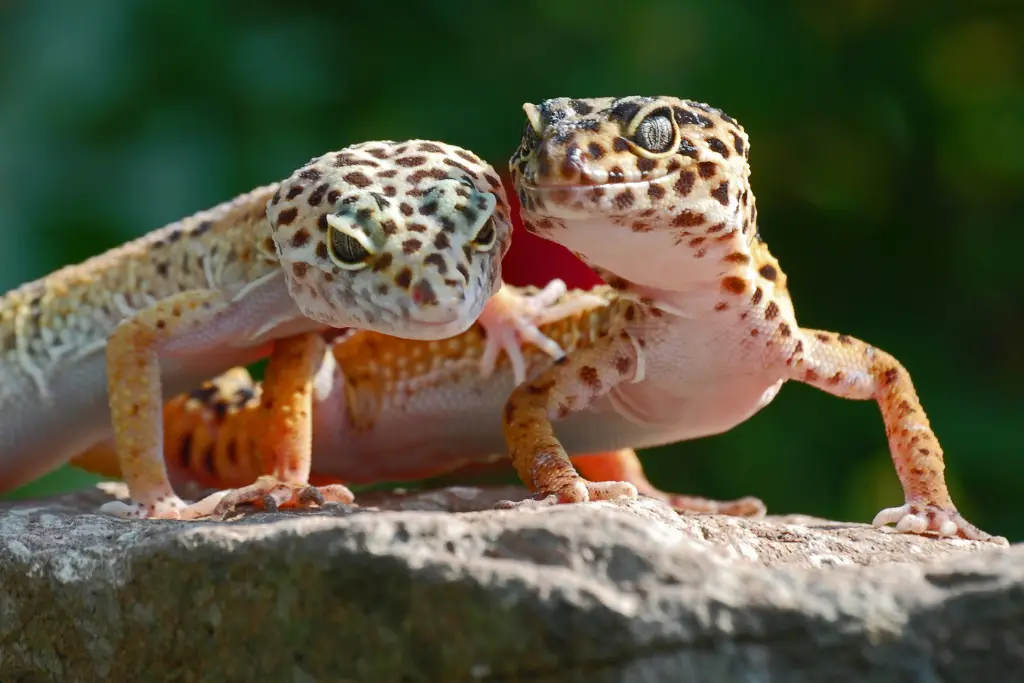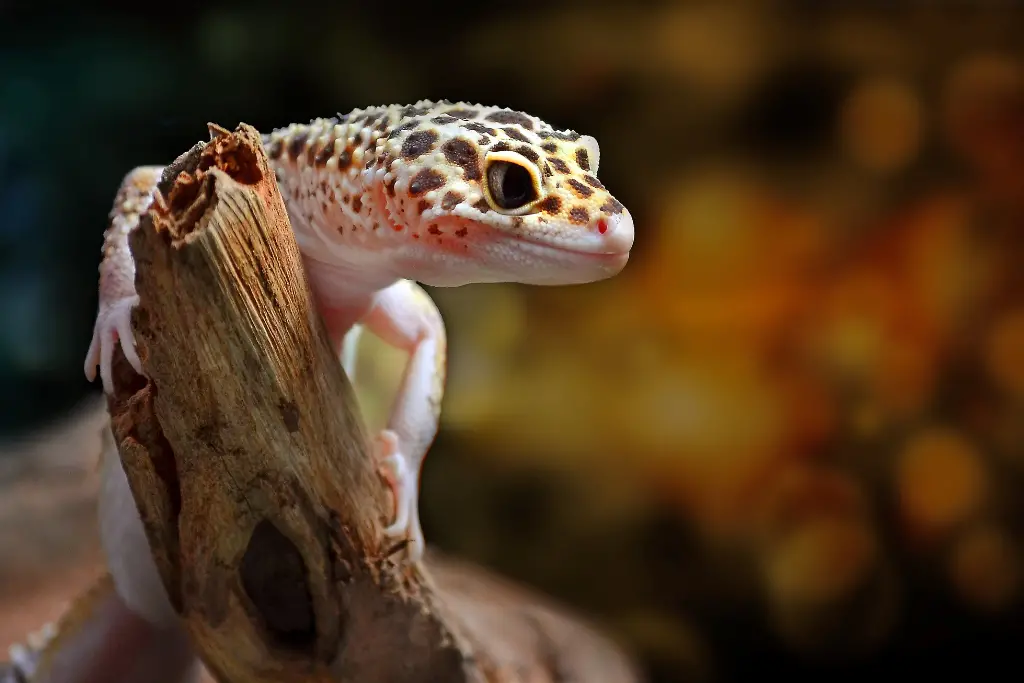Can Leopard Geckos Get Depressed? Leopard geckos are not the most social of reptiles. They typically live alone and only come together to mate and because of this, many people believe that leopard geckos can get depressed.
There are many things you’ll need to learn about your leopard gecko if you want it to be happy and healthy. One of these is being able to recognize their emotions, which can take time but will become easier with practice.
Being able to read the mood of leopard geckos takes some skill, however, as reptile owners, we have an obligation not just for our pet’s health but to make sure they are also comfortable in their environment.
A good way to start is by watching your leopard gecko. Do their colors seem dull, or do their scales have the normal sheen and brightness? Does it look like they’re sleeping more than usual? Is there any other sign that something might be wrong with them emotionally?
A lot of people just don’t know what to watch out for when it comes to emotional signs in reptiles because not many people can read emotions on replies well.
We usually rely on behavioral changes such as excessive hiding, aggression, loss of appetite, nocturnal activity patterns (particularly at night), increased vocalizations such as chirping or hissing–to understand if our reptile is happy.
Related Article
How To tell if your Leopard gecko Is Depressed?
If you’ve been looking out for the signs of depression in your gecko, and you feel like something’s not right, even if it’s hard to put a finger on what that is you might want to consider taking them into seeing a veterinarian.
This can help reassure you that everything will be alright or even better get treatment. Alturnitvley, there are signs you can look out for to see if your leopard gecko is depressed.
Not Eating
If your gecko is not eating then this could be a sign that they are feeling depressed. If they stop eating, then you’ll want to take them in for a check-up as soon as possible so that your gecko can get the help and care they need to start feeling better.
Not eating can seriously affect the health of the gecko which could even lead to death if your not careful!
Sleeping A Lot
If you are noticing changes in the amount of sleep your gecko is getting then this could be a sign that they are feeling depressed.
If not, then it might just be because they’re old or having trouble sleeping and all they need is some assistance from home to get over their snoozing difficulties.
But if there’s any doubt about whether depression may also be affecting them, it’s worth giving them the attention and care they need. The best way we can ensure our pets mental health is through providing an environment where they feel safe and loved
Shows Aggression
Aggressive behavior in reptiles can have many different causes including stress, low blood sugar levels from not feeding properly as well as mental health issues like depression.
Aggressive behavior in reptiles can have many different causes including stress, low blood sugar levels from not feeding properly as well as mental health issues like depression.
If the aggression is towards other animals then it might be worth looking into a professional’s opinion on what may be causing this change in behavior.
But if this is not the case and you’re the only person being targeted by their aggressive outbursts then depression could also be at play here.
Hiding
Some reptiles may also show signs of not wanting to socialize with humans and will end up hiding in their enclosure for extended periods of time.
If your leopard geckos is showing these symptoms then it’s worth considering the fact that your reptile could be depressed and getting them the care they need for this condition should be your next step.

Do Leopard Geckos Have Emotions?
Leopard geckos do have emotions are known to get moody, so it’s important for owners of these lizards to be able to tell when they’re unhappy.
If you can’t figure out what your pet is feeling or if the changes that have been made haven’t worked well enough, make sure and ask an expert before making any more adjustments.
According to Dr. Sharman Hoppes, clinical assistant professor at the Texas A&M College of Veterinary Medicine & Biomedical Sciences, the main two are emotions reptiles show fear and aggression, but they may also demonstrate pleasure when stroked or when offered food.
www.vetmed.tamu.edu
Geckos that are sad will have a sluggish, unresponsive personality. You may notice changes in the way your pet acts or reacts to things you used to make them happy and excited.
As before, Your pet could also lose its appetite but this could be because of something other than sadness like sickness or aging so it can’t always be assumed that there’s nothing wrong with an unhappy animal just from these two symptoms alone!
An unhappy gecko will act very differently becoming slow, lazy, and wanting little interaction while showing less interest in what makes them usually interested (like new food for example).
They’ll probably spend most days sleeping instead of participating in activities that are enjoyable when they’re feeling well-rested.
How To Improve A Geckos Depression?
Gecko owners may find themselves caring for their gecko, but not knowing how to make them happy and content. This is because there are no specific guidelines on what to do when your gecko is depressed or feeling down.
However, below we will discuss some ways you can help improve your gecko’s depression. To give you an idea of what we mean here are some points to consider when assessing the gecko’s environment.
A happy leopard gecko is one that lives in the best environment. One of which is making sure the temperature and humidity levels are at the correct levels.
- Temperature and humidity levels are not too hot or dry. The temperature should be in the range of 23°C (73°F) – 32.0°C (89.0 degrees Fahrenheit). Humidity should also be similar, at around 60%.
- Make sure there is a place for your leopard gecko to hide if it feels threatened and wants some privacy from other pets like dogs or cats that may scare it while you’re away
- Use a variety of surfaces such as stone, mossy bark chips, tree limbs with leaves on them, etc., so that there’s always something new for your pet to explore. This way Your Gecko won’t feel bored.
- Talking to your gecko is a great way to make them happy and talking before handling or feeding can not only take the stress of your little reptile but also reduces the chance of startling him/her.
- If they startle at the sound of your voice, try talking in more gentle tones – if this doesn’t work then just stay with him for a while without any contact until the gecko calms down then try again.
- Isolation is another thing that can really make your gecko sad so having at least two reptiles as a companion in the same tank can help avoid them getting depressed.
- Provide more places for climbing and hiding, there should be at least two different levels or a variety of heights – Also place food on different levels so that the gecko is forced to climb up and down in order to eat.
So if you’re not happy with the state of your gecko, it’s time to take action. Geckos will become depressed if they are left alone and don’t have enough stimulation in their environment.
Conclusion
So Can Leopard Geckos Get Depressed? Yes, and when they do you might notice some behavioral changes with depression such as nocturnal activity patterns, and If there’s any doubt of whether your pet could be suffering from depressive symptoms you should consult with a vet asap.
Depression is something we don’t often think about when it comes to our pets whether they’re fish or reptiles or mammals, but just like us all animals have feelings too.
A variety of surfaces such as stone, mossy bark chips, tree limbs with leaves on them, etc., will keep your pet from feeling bored and talking to the animal before handling or feeding it is a great way to introduce yourself in gentle tones.
If they startle at just the sound of your voice try speaking more gently while you stay with him/her for a while without any contact until he’s calmed down again; leaving a stressed-out gecko alone after being agitated isn’t advised!
Related Article




